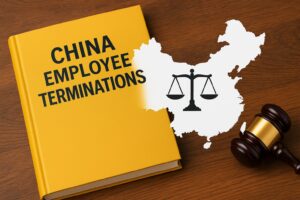China Distribution Relationships
We have written recently about the trend in China business as companies move away from joint venture relationships toward distributor relationships. This is happening with Chinese manufacturers and their non-Chinese distributors in the distributor’s home market. This is also happening in China with Chinese distributors or representatives and the non-Chinese manufacturers and service providers they represent.
I am not necessarily talking about direct sales companies (see here) with hundreds or thousands of distributors in China (see Who is Still Doing Business in China?), who continue to do business in a variety of creative ways, ranging from wholly legal to somewhat questionable.
This post focuses on foreign companies engaging one or more third-party distributors or sales agents based in China. These non-employee representatives need serious titles to successfully represent the foreign company in China, especially if the sales channel involves Chinese government stakeholders. This is simple to understand but also easy to get wrong.
When establishing distributor relationships in China, two key factors can make or break your Chinese representative’s success: their title and the authority you grant them. While clear contractual terms are crucial, strategic titling and delegated legal powers pave the way for your distributor to build sales, especially with government stakeholders. This article explores how international companies entering China can legally empower local partners, unlocking growth while minimizing risks.
Two Ways to Delegate Authority to Do Business in China
For most companies, there are two key issues regarding their Chinese agents. First and most importantly, the distribution or agency agreement terms need to be absolutely clear. Sometimes these contracts are written with the titles of distribution agreement, dealer agreement, agency agreement, relationship agreement, or something similar.
In the legal world, contract titles matter much less than the content. It’s important for companies to make sure they’re only giving their Chinese partners the specific powers they need, nothing more. Without an airtight dual-language contract governing the relationship, companies risk their China operations spiraling out of control. (see Dual Language China Contracts: Don’t Get Fooled!).
The second issue is ensuring that the company’s Chinese representatives get important-sounding titles without providing them any implied authority. This is relatively easy to prove with a good contract. If there’s a problem because the Chinese partner acted beyond their given role, it can be a major issue to fix. Relying on fragmented WeChat chats or emails rather than a clear contract makes resolving issues extremely difficult, especially in a Chinese court.
A Bit About Agency Law in China
The legal concept of “agency” refers to the legal rules in China that govern how one person can act on behalf of another in business. This is covered under China’s business and civil laws.
The “legal representative” is a key person in Chinese law, similar to a CEO. They have significant legal responsibility for a company’s actions in China, which can cut both ways. They can take any legal actions on behalf of the company, but they are also who the government comes looking for if things go badly.
For wholly foreign-owned enterprises operating in China, the legal representative is typically the president of the foreign parent company, with certain authority delegated to China-side personnel.
Some companies try to keep their distance from China without wanting to look like they are keeping their distance – hence the distributor business model. These types of companies are not registered in China directly and do not have a subsidiary in China. We still use the same Chinese law principles surrounding the legal representative role to provide certain delegated authority from the overseas parent company to the authorized representative in China.
Action Points for Companies Already Midstream in China
To enable a China agent to exercise specific powers on behalf of the foreign company, especially in dealings with the Chinese government, we recommend:
- Change the title of the foreign representative company’s key person to a higher level with a China signifier, particularly a title that can be recognized as a member of the management team, such as Director/Manager/President, [Company Name] China (or China Business or something analogous). The individual should have business cards and could also have a company email address.
- Issue an authorization letter signed by the foreign parent’s legal representative (that could be a board member or key executive – see below) on company letterhead. This letter should outline the specific legal matters for which the individual is authorized to act on behalf of the company and the scope of his authorization. This will reduce the risk of your Chinese partners making decisions that seem like they’re officially from your company, but aren’t actually authorized. This should be prepared in both English and Chinese. The foreign company typically will not have a chop, so letterhead is the next best thing (see China Contracts that Work. Get the Company Chop Right).
- Ensure that this entire relationship is authorized by a resolution of the foreign parent’s board of directors or similar governing body to clearly show the limited delegation of authority. The authority to sign this authorization letter on behalf of the company should also be clearly delegated.
- Amend any existing agreement with the China representative to clarify this change and reiterate the limited authority granted to the China representative.
Conclusion
If your China agent is underperforming, examine whether granting additional authority could remove roadblocks to sales. This may seem like a small matter, but modifying a China-side title can make all of the difference in helping your China representative open doors in China where they have been closed. At the same time, ensure that you do not inadvertently provide too much authority to your China representative and that you have sufficient safety valves to terminate the relationship if they are clearly not the right business partner.
There’s a trend in China’s business landscape moving from joint ventures to distributor relationships. Clear, dual-language contracts are crucial in defining the relationship and authority of Chinese agents.
Strategic titles for representatives in China can aid in business, especially when dealing with government stakeholders. Understanding China’s agency laws, particularly the role of the legal representative, is essential. Companies should carefully issue titles and authority to their representatives and ensure all arrangements are legally sound and clearly documented, and they should have their China legal counsel regularly review and adjust the delegation of authority to ensure protection, effectiveness, and compliance.

























